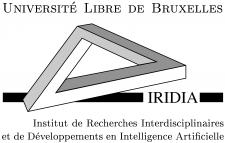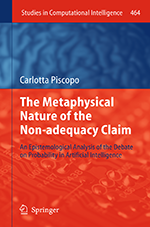 |
Carlotta Piscopo, PhD
IRIDIA - CP 194/6
Université libre de Bruxelles Avenue Franklin Roosevelt 50 1050 Brussels - Belgium
|
 |
Post-doctoral researcher at IRIDIA from 2012 to 2015 (part-time).
Keywords
Artificial intelligence, philosophy of science and engineering, invention, creativity, and innovation.
Research Interests
I have been active in the domanin of artificial intelligence. In particular, I focused on the philosophical and epistemological foundations of this domain. I published a book on the debate concerning the adequacy of probability for dealing with uncertainty in artificial intelligence. I did research also in philosophy of science and in particular on the status of scientific theories and in the realism/anti-realism debate. I investigated issues related with the construction and the selection of scientific models on the basis of empirical evidence, the problem of induction, and the relation between metaphysics and science. Finally, I worked in philosophy and history of engineering and technology with a focus on innovation and on the source of inspiration for invention. I studied also the methodological and epistemological foundations of cooperative and distributed problem solving in collective robotics.
Public Lectures
C. Piscopo (2014). De l’incertitude des machines: rôle stratégique et enjeux épistémologiques de l’intelligence artificielle. Académie royale des Sciences, des Lettres et des Beaux-Art de Belgique. Collège Belgique. April 3, 2014. Lecture on the societal impact of artificial intelligence and its innovative applications.
Publications
Books:
C. Piscopo (2013). The Metaphysical Nature of the Non-adequacy Claim: An Epistemological Analysis of the Debate on Probability in Artificial Intelligence. Studies in Computational Intelligence, vol. 464. Springer, Berlin, Germany.
Synopsis: Over the last two decades, the field of artificial intelligence has experienced a separation into two schools that hold opposite opinions on how uncertainty should be treated. This separation is the result of a debate that began at the end of the 1960's when AI first faced the problem of building machines required to make decisions and act in the real world. This debate witnessed the contraposition between the mainstream school, which relied on probability for handling uncertainty, and an alternative school, which criticized the adequacy of probability in AI applications and developed alternative formalisms.
The debate has focused on the technical aspects of the criticisms raised against probability while neglecting an important element of contrast. This element is of an epistemological nature, and is therefore exquisitely philosophical. In this book, the historical context in which the debate on probability developed is presented and the key components of the technical criticisms therein are illustrated. By referring to the original texts, the epistemological element that has been neglected in the debate is analyzed in detail. Through a philosophical analysis of the epistemological element it is argued that this element is metaphysical in Popper's sense. It is shown that this element cannot be tested nor possibly disproved on the basis of experience and is therefore extra-scientific. It is established that a philosophical analysis is now compelling in order to both solve the problematic division that characterizes the uncertainty field and to secure the foundations of the field itself. [Download Springer's flyer]
A review of my book has been published in Metascience:
- James Cussens (2014). Probability, uncertainty and artificial intelligence. Metascience, vol. 23, no. 3, pp.. 505-511. DOI: 10.1007/s11016-014-9888-5
Peer-reviewed Publications:
- C. Piscopo and M. Birattari (2013). Invention vs. discovery. In E.G. Carayannis (Ed.): Encyclopedia of Creativity, Invention, Innovation, and Entrepreneurship, pp. 1139-1146. Springer, Berlin, Germany. DOI: 10.1007/978-1-4614-3858-8_402
- C. Piscopo and M. Birattari (2010). A critique of the constitutive role of truthlikeness in the similarity approach. Erkenntnis, vol 72, no. 3, pp. 379-386. DOI: 10.1007/s10670-010-9218-2
- C. Piscopo and M. Birattari (2008). The metaphysical character of the criticisms raised against the use of probability for dealing with uncertainty in artificial intelligence. Minds and Machines: Journal for Artificial Intelligence, Philosophy and Cognitive Science, vol. 18, no. 2, pp. 273-288. DOI: 10.1007/s11023-008-9097-3
- C. Piscopo and M. Birattari (2002). Invention vs. discovery. A critical discussion. In S. Lange, K. Satoh, C. H. Smith (Eds.): Discovery Science. 5th International Conference, DS 2002, LNCS 2534, pp. 457-462. Springer, Berlin, Germany. DOI: 10.1007/3-540-36182-0_49
Theses:
- C. Piscopo (2012). Metaphysical Arguments in Artificial Intelligence. A Case Study. PhD thesis, Faculté de Philosophie, Arts et Lettres, Université Catholique de Louvain. Louvain-la-Neuve, Belgium.
- C. Piscopo (2000). Un Punto di Vista Filosofico sul Trattamento dell'Incertezza in Intelligenza Artificiale. Tesi di Laurea, Facoltà di Lettere e Filosofia, Università degli Studi di Milano. Milan, Italy.
Some Selected Technical Reports:
- C. Piscopo and M. Birattari (2008). The explanation of the success of science. Technical Report TR/IRIDIA/2008-013. IRIDIA, Université libre de Bruxelles, Brussels, Belgium.
- C. Piscopo and M. Birattari (2007). Philippe Smets and the transferable belief model: An epistemological perspective Technical Report TR/IRIDIA/2007-001. IRIDIA, Université libre de Bruxelles, Brussels, Belgium.
- C. Piscopo and M. Birattari (2002). Probability theory and intrinsically non-stochastic phenomena in AI: How to reject a metaphysical issue, Technical Report AIDA-2002-04. Intellektik, Technische Universität Darmstadt, Darmstadt, Germany.
Membership in Professional Societies
- ECCAI, European Coordinating Committee for Artificial Intelligence
- AI*IA, Associazione Italiana per l'Intelligenza Artificiale
- BSLPS, Belgian Society for Logic and Philosophy of Science
- BSPS, British Society for the Philosophy of Science
Organisational Activities
- Local arrangement chair of the 6th International Conference on Ant Colony Optimization and Swarm Intelligence, ANTS 2008 (Brussels, 22-24 September 2008).
- Local arrangement chair of the Workshop Engineering Stochastic Local Search Algorithms, SLS 2007 (Brussels, 6-8 September 2007).
- Local arrangement chair of 5th International Workshop on Ant Colony Optimization and Swarm Intelligence, ANTS 2006 (Brussels, 4-7 September 2006).
- Local arrangement chair of the 4th International Workshop on Ant Colony Optimization and Swarm Intelligence, ANTS 2004 (Brussels, 5-8 September 2004).
Extracurricular Activities
I practice Brazilian jiu-jitsu and I currently hold a brown belt. I am a co-founder of Kaizen BJJ Brussels, a non-profit organisation for the promotion of Brazilian jiu-jitsu as a way to develop and improve physical, mental, and social skills. At Kaizen, I am the instructor of the kids—currently 35, aged between 4 and 14.
Last update: November 2022.
